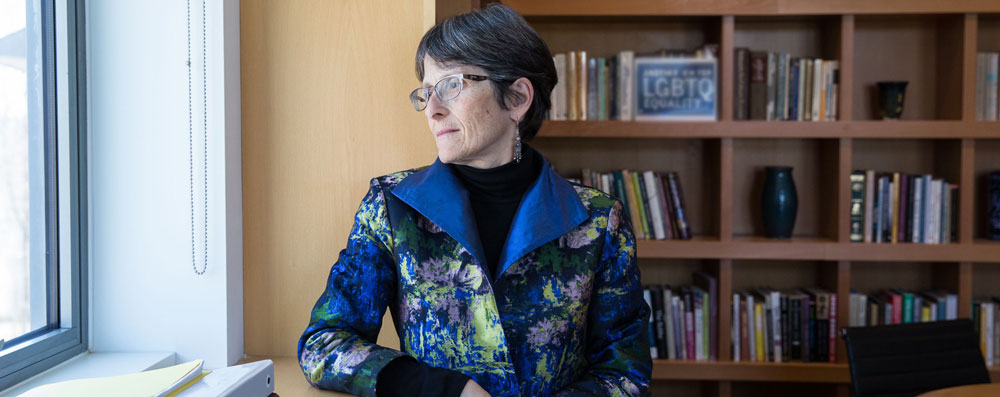Community Blog President’s Message:
After Colleyville

Dear friends, near and far,
At 7:10 this past Saturday night, as we watched, waited, and prayed while the terrifying hostage situation unfolded in Colleyville, the following message arrived in my email inbox:
“Colleagues: I am keeping vigil with all of you as we lend our fiercest prayers for a peaceful resolution to the hostage situation in Texas. God help us. The work of the Miller Center matters desperately.”
The message was from Reverend Nancy Taylor of Old South Church in Boston, written to a small group of people – Jewish, Christian, and Muslim — who serve on the Advisory Council of Hebrew College’s Betty Ann Miller Center for Interreligious Learning & Leadership.
I was grateful that she wrote so clearly, simply, and succinctly. I am with you. God help us. Our work matters. Above all, I was grateful that she wrote.
A few hours later, we learned that the hostages had emerged safely. Nancy wrote again, presciently, to say: “A good outcome for the hostages, but the trauma, exhaustion and relentless wariness continues.” Indeed. We are grateful beyond words that the hostages of Congregation Beth Israel escaped safely last Saturday night. And we know in our bones that this story did not begin there, nor does it end there.
Why do I share this now?
First, I re-learned an important lesson that night. So often, we want to reach out to someone we know is in pain and we hold back. Because words feel inadequate. Or because we fear that we will somehow embarrass ourselves by choosing the wrong words. Nancy reminded me that it is worth taking the risk. However small and inadequate the gesture may feel to us, it may mean more to another than we will ever know. It is worth taking the risk.
Second, in the days that followed, I heard something else, especially from my younger Jewish colleagues. I heard that their non-Jewish friends were very quiet about this subject. Silent, actually. And that silence was unsettling, isolating, painful. How could it be, they wondered, especially in their circles on social media, that there was such an enormous divide between their Jewish friends – deeply shaken by this most recent act of anti-Semitic violence – and their non-Jewish friends – seemingly oblivious to what had taken place.
I was surprised to hear this, at first, but I shouldn’t have been. It is one among countless examples of the ways in which we have surrounded ourselves (whether literally or virtually) with people who think like us, speak like us, read the news like us. We may do so seeking safety. But it is becoming clearer and clearer that, separated in our self-protective silos, our lives are ultimately both impoverished and imperiled.
In her exquisitely, achingly beautiful TED talk entitled “The Dangers of a Single Story,” [Chimamanda Ngozi Adichie: The danger of a single story | TED Talk] Chimamanda Ngozi Adichie speaks about our tendency to reduce ourselves and each other to “a single story.” When we do this, it diminishes our humanity, it flattens us, and sometimes it threatens our very lives.
My plea to all of us this week: if you have been telling yourself a single story about what it means to be a Jew in America today, try listening more carefully – and generously – to voices that interrupt and disrupt your single story.
If, for example, you are someone who thinks “they’re all out to get us,” then allow yourself to hear the voice of Reverend Nancy Taylor saying, “I am with you.”
If you are someone, for example, who thinks “it can’t happen here,” or antisemitism is not something you need to take seriously, try reading this important piece by Yair Rosenberg in today’s Atlantic. Why So Many People Still Don’t Understand Anti-Semitism – The Atlantic.
This is our work, more urgent now than ever. The work of fighting against the dangers of a single story. This is the work of pluralism, it is the work that our multi-vocal Jewish tradition summons us to, and it is the work of all serious education.
This work demands of us intellectual honesty and rigor, and it also requires strengthening the muscles of our aching hearts. We need to cultivate hearts that are subtle, supple, and resilient enough to hold more than a single story, to make room for truths that are more layered and complex – in other words, more human — than what our current ideological echo chambers allow.
To my dear colleagues at Hebrew College, to our treasured alumni, to our friends and partners, to all those bravely doing this work in communities all over the country, in Israel, and around the world, I want to say: I am with you. God help us. Our work matters.
Blessings,
Rabbi Sharon
Rabbi Sharon Cohen Anisfeld is President of Hebrew College in Newton Centre, MA.

